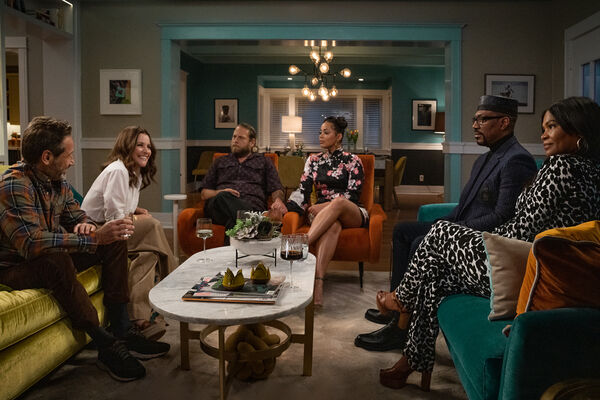Newsletter
Feb
9
2023
Dear Reader,
I groaned with the whole of my being when I saw the trailer for You People, Netflix’s new interracial rom-com, written by actor Jonah Hill and black-ish creator Kenya Barris. The movie tells the story of Ezra, a white Jew, and Amira, a Black Muslim, whose love affair is challenged by the patronizing, casual racism of Ezra’s progressive mother (Julia Louis-Dreyfus) and the antisemitism and militant separatism of Amira’s Farrakhan-loving father (Eddie Murphy). I knew it was going to be bad, I just wasn’t yet sure what kind of bad. So I watched. And yeah, it was dumb—but no more so than any studio rom-com! As devoted readers of this newsletter already know, I believe we can’t expect rom-coms to do more than give us a few laughs before we forget them entirely. You People did exactly this; it had its moments, and my sister and I were totally satisfied zoning out to it on a lazy evening together.
So it was a bit of a shock when Jewish pundits began slamming the film online and in the media. In a piece in The Forward cataloging the movie’s various offenses, Mira Fox wrote that the film seems to be posing the question of “whether Jews are actually the worst kind of white people.” Meanwhile, on her own platform and in Newsweek, blogger Allison Josephs went so far as to say that the film is an incitement to violence, and stoked racist fears by suggesting “a man walking around in a yarmulke [has] to worry about potentially getting assaulted by a Kenya Barris fan.” (She cites limited data about attacks in Brooklyn, bogusly extrapolating that Black men are responsible for the majority of all antisemitic attacks.) Jews Don’t Count author David Baddiel jumped into the fray with his famous catchphrase, which paradoxically laments the wrongheadedness of the oppression olympics while also trying to win the most medals.
The response was more interesting than the film. So we brought contributing writer Rebecca Pierce, critic and essayist Jasmine Sanders, and writer and Know Your Enemy co-host Sam Adler-Bell back on our podcast, On the Nose, to continue the inquiry they started after Dave Chapelle’s Saturday Night Live monologue about whether Jews can take a joke. The thing I’m sitting with in the days since we spoke is the intensity of the Jewish discomfort with a portrayal of white, privileged, progressive-but-racist Jews. I would imagine that for many of us these portrayals feel uncomfortable precisely because they’re close to home, and not because we’re afraid of being attacked in the streets. In this regard, maybe You People does, to my surprise, present as a useful text.
You can listen to the episode here, but we’re including a little excerpt from the transcript below.
Best,
Arielle Angel, editor-in-chief

The cast of You People.
Courtesy of Netflix
Sam Adler-Bell: It’s wild that all these Jewish pundits are saying, “Oh God, there’s so many terrible Jewish stereotypes, this movie is so offensive to us and so dangerous.” It’s like, isn’t the Eddie Murphy character also a stereotype?
Arielle Angel: Totally.
SAB: The idea that even if he was NOI, that this character would like be just completely uncomplicatedly pro-Farrakhan. He wears the kufi that Farrakhan gave him to dinner, it’s all over-the-top stereotypes. But for whatever reason, Jews in the media right now are just so ready to take offense. And I think it’s specifically when Black people are involved, when the voice of criticism is Black people, [Jews] lose their shit. That’s what our last podcast was about!
Rebecca Pierce: If you watch the scene that everyone’s upset about where they’re talking about Farrakhan it’s really clear that Eddie Murphy and Nia Long’s characters are not supposed to be right in the scene.
SAB: No, obviously not!
RP: They kind of get the last word in a certain way. Like, I can see wanting more of a response from the Jewish characters in that moment, it felt a little incomplete. But they’re supposed to be wrong and ignorant. That’s the whole point of that scene! So if you’re watching that, and you’re like, “Kenya Barris is a Farrakhan fan,” I’m sorry, but you don’t understand how to read a piece of media or you’re intentionally misconstruing that scene. It’s not what it’s supposed to be about. [ . . . ] They’re wrong. And it’s just kind of played for laughs. That’s the whole point. And if anything, I think Black folks have reasons to push back against that representation as well.
Jasmine Sanders: I feel like it’s kind of understood that Farrakhan is a punch line. I’m from Chicago, which is NOI headquarters; I could have been in the Nation of Islam if things had gone differently in my life, and even I don’t that don’t take Farrakhan that seriously! Like, if the main threat against your community is Louis Farrakhan . . . come on, it’s not 1983 anymore. I think the way he’s using the NOI characters in this movie is meant to be like a kind of funny faux militant.
SAB: Well, Eddie Murphy’s brother EJ, played by Mike Epps, calls him Woody, even though he’s changed his name to Akbar. But he’s like, “Woody, come on, you’re Woody, you just became militant one day and that became your identity.” The idea that it’s a put-on is text in the movie.
AA: It’s funny, I’m going back to [Jews Don’t Count author David] Baddiel’s quote: that the Jews are “positioned as white, privileged and racist,” but “the black family just have a stern dad.” There’s a complete inability to read any texture into what’s being done with that character.